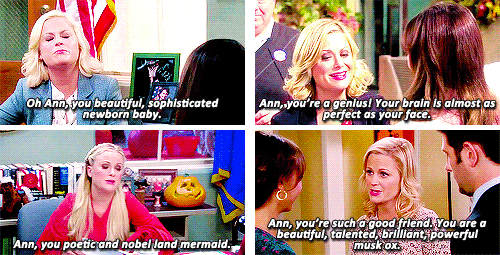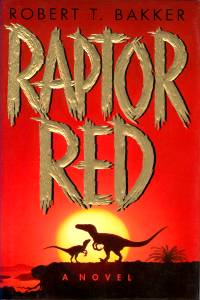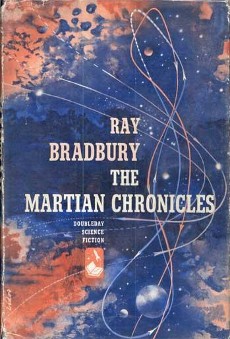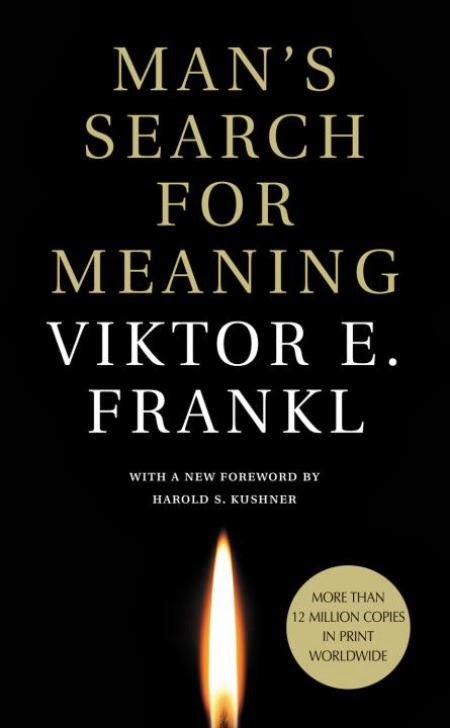Staff Picks, Part V: Nicole
Tuesday, Nov 29, 2016
A new addition to our staff means a new addition to our blog series on staff picks! These are our responses to the question: “What are 10 books that are memorable for having some kind of impact on us as readers?” Many of them are titles that spoke to us at different points in our lives, and may not be our current favorites. We captured a kind of “highlights of our individual reading histories.”
How do we describe Nicole? She's a perfect, pregnant sunflower...a cunning, effervescent, chesnut-haired unicorn...a brilliant, talented, powerful blood moth...a clever, glorious, organized, sun goddess...
She's the Ann Perkins to our Leslie Knope. If that's not enough, she's a total triple threat: she has two B.A.s and an M.A. (studio arts & humanistic psychology), she's a professional researcher, and she's a total nerd. Nicole brings her Vulcan mind, her expertise in fine art and antiques, her skill in paper arts, and her experience in online selling to our operation. Whether it's astrophysics or knitting, John James Audubon or Doctor Who, Nicole is passionate, knowledgeable, and enthusiastic. We're all so excited to introduce the newest member of the Underground Books family to you!
 Raptor Red by Dr. Robert T. Bakker
Raptor Red by Dr. Robert T. Bakker
Raptor Red really appealed to the little Nicole in me. Educational, gripping, and unique, it’s a raptor’s story of love and loss, almost like Pride and Prejudice with dinosaurs. It’s completely told from the perspective of animals, which is incredibly difficult to do, and the author does it so well. A female Utahraptor during the Cretaceous period loses her love and is on a mission to find her sister again. I later found out that the author, Robert T. Bakker, is a paleontologist who changed the whole world’s perception of dinosaurs, not only consulting on the film Jurassic Park and even inspiring much of the character of Dr. Alan Grant. At the time, there was a lot of confusion between Velociraptors and Utahraptors, which are the main characters in Raptor Red. Bakker was saying they would find the bones someday and that they were more intelligent than expected and that they descended from birds, all important theories that would play out prominently in the films. The author also does an incredible job explaining the social structure of these animals, all the while telling it from their perspective. Bakker is and his theories are secretly responsible for why people of this generation are fascinated with dinosaurs. People didn’t have that bug in them before Bakker. I would recommend this book to young adults and adults alike. Trust me, you will never read another book like this. I’ve recommended this book to all kinds of people, and no one is ever disappointed.
The Martian Chronicles by Ray Bradbury (pre-1997)
Everyone’s read Fahrenheit 451, but really everyone should read The Martian Chronicles. It is quite frankly one of the most apt and lovely examples of science fiction acting as an observation of timeless issues within the human condition. There are three sections (past, present, and future) to this collection, which you can read as a progressive novel or as short stories, and Bradbury’s tone changes throughout so you get to experience all of the different languaging that he is famous for. Unfortunately, in 1997, publishers took out two stories from this important collection. In the publisher’s note, he says these two stories were cut because they are no longer socially relevant, but I couldn’t disagree more. Those two stories are significant because they were about Civil Rights, discrimination, and bigotry. The choice to cut them seems ugly, privileged and perhaps even telling of assumptions in the literary world that some fall victim to. On top of that, all of the dates Bradbury used in the chapter headings have been changed in the 1997 version, rendering the Cold War context of the writing almost meaningless. I consider this censorship too. The core of sci-fi is commentary on our social and cultural predicaments, using various outlandish plot devices or narratives so it doesn’t feel so threatening on a personal level. There’s a reason Bradbury was writing these particular things in the middle of the century, and we can learn from that context and apply it to the world today. So I prefer the pre-1997 copies of this book. I believe that Bradbury, a fierce champion of free speech, would as well.
 The Road by Cormac McCarthy
The Road by Cormac McCarthy
The Road is different in its tone and cadence than McCarthy’s other books. People say it’s bleak, but I haven’t left a book feeling so grateful before. I’ve read a lot of apocalyptic books, but there is something different about The Road. It reminds you of the importance of family and what it means to have mindfulness in the moment even when it’s bleak and awful. Reading this book left me with everlasting gratitude, it felt like a spiritual reading because his language is so simplified, and it goes back and forth between the father and his child. It only leaves room for me to experience the most pure emotions. Unlike his other works, a lot of the overt intellectualism starts to dissipate and you fall into the melody of what it means to just simply live. Within the text, you are captivated and taken to this unimaginable place, and because of that it is more bodily, more physical than his other books. I wouldn’t recommend this for vacation reading (which is what I actually did with my first experience with it) and instead prepare yourself for an emotional rawness that will linger for quite sometime.
Ready Player One by Ernest Cline
I picked this book up because of the gamer community. For my fifth birthday I got the Nintendo NES system. It was an amazing new escape, this new technology the world had never really seen before and I have been hooked ever since. Ready Player One combines reading and video game “nerd culture,” my two favorite ways of escaping. It is also an endless slew of pop culture references that manifest in finding that one video game “Easter Egg.” It’s a fun, easy book IF you span the gamut of nerdom; you’ve got to have an affinity for 80s references. The language is accessible, but it’s all about reference, good clichés, and nostalgia, even the way he structures his sentences. The story itself is actually tons of “Easter Eggs” within “Easter Eggs,” and if that term is not already part of your lexicon, I would say that this book is definitely not one for you. It’s an adventure book for nerds of media, movies, and music of the 1980s, the decade that brought us the advent of the internet, and it’s especially cool for those born in the early 80s, who can remember the world before and after the internet. Some criticize this work for pandering to a certain demographic, but for me personally, I found it to be a wonderfully fun escapist read. There are ways that Cline could have certainly expounded upon social and cultural issues presented in his story, but again, I don’t think that is the overall purpose of this book. It’s instead about indulging your inner geek and letting go of all those heady intellectual criticisms.
This is another book that takes multiple stories and merges them. What I love about this writing is that, like the protagonist, you really feel lost; you understand the words, concepts, references (1984), but everything is new and you are searching. Hurakami gives reflections of where you are, and I’ve never experienced a writer doing this before. Keeping readers in a liminal space is difficult, and you start to realize that is part of his method. It’s also really funny, and then there are moments that are really heady. If you’re looking, this has a little bit of everything. But you have to focus. This is a meditation time kind of book, it’s not beach reading. Vivid. Like The Road. It’s vividly written, with these two worlds intertwining, you feel the tension of them coming together and you are an active participant in it. With the original 1984, I think that some of its drawback is that it still felt distant. 1984 is linear: Big Brother, that’s a good warning, it’s far away from happening. With 1Q84, it’s about two worlds merging, and you’re wanting them to be drawn together, grasping for a way for these two narratives to come together. It doesn’t feel distant, it feels more participatory, because you’re more present and involved. You wonder if it’s all going to come together. You have to be present for the magic to happen.
The Heart Goes Last by Margaret Atwood
I love Atwood. Everyone who is looking to explore more feminist ideals, Margaret Atwood is a strong woman who, despite her age, is so on the pulse of current socio-political issues. You need to be reading Atwood. Or if you’re just a dystopian sci-fi nut, it’s perfect. In the world of The Heart Goes Last, resources are limited, and we only have so much to go around, so you experience this life only for so much time, and you share your home, even your relationships. The concept of dystopian prison systems is not new, but the way Atwood presents it is, and if you’re going to read about it, do it with her. She’s going to take you on the best journey of that nature. It is creepy, and you do feel disrupted the whole time. It’s uncomfortable, and you’re not sure why. But as you’re reading about this couple’s everyday existence, how they look forward to things like going to get a scooter repaired, you feel not only unsettled, but grateful, with a renewed appreciation for what you do have.
 Man’s Search for Meaning by Victor E. Frankl
Man’s Search for Meaning by Victor E. Frankl
Everything I’ve read has left an impression on me, but this one engraved something on my soul. Man’s Search for Meaning gave me something I could go back to and reference every time I need it. To know that he lived, that this was his experience, and a brand new phenomenal philosophy came out of it is incredible. Man’s Search for Meaning changed me more than any other text I read in the psych program at UWG. Out of all the books I’ve read in my academic career, I would say that this alone was worth all of the years. It’s about making meaning out of choosing, more so than any other religion or ideology that I’ve ever read of could accomplish. And it all comes out of his experience in a concentration camp. You cannot believe that this man chose to find meaning in being on his knees, being degraded, and still in every second he chose to create his own meaning. I refer back to this book daily.
Stardust is the reason I read Neil Gaiman. I was looking to relate to other quirky comic book readers and that sort of thing, but I also wanted to read something with “real’ words and paragraphs, which is what I told the guy at the comic book shop, and thankfully he introduced me to Neil Gaiman’s graphic novels. It has a special nostalgic place in my heart. You’re reading a fairy tale, but all the characters are not at all what they’re supposed to be. Princesses are supposed to be pleasant. Princes are supposed to be able to easily save the day. With Stardust, the fairytale concept is very original and unexpected; completely turned on it’s head. She’s a fallen star, he’s in search of a fallen star as if she’s an object, he needs one to complete his quest. She doesn’t know she’s an object. Gaiman writes objects into people! That’s magic. If you are in search for quirky and fun, look no further than Neil Gaiman.
 The Glass Castle by Jeannette Walls
The Glass Castle by Jeannette Walls
This is such a haunting memoir. Of all the books about trauma and healing, this one felt to me like the most honest. It is not manipulative or attention-seeking, it didn’t feel like therapy for her either. It is not disrespectful to members of her family, though they were atrocious; it’s not voyeuristic, not sensationalized at all. Instead, it is a gentle exposure of the truth. The truth is never bad, it may be ugly, but it’s not bad. Walls very carefully weaves her story, both her tragic childhood and her current success into this tapestry, and she ultimately shows that these parts of her weaving are just as important as the part of her that is capable and privileged enough to tell you her story now. Gentle and brutal at the same time, I have never experienced that in a memoir about trauma. Plus, there is excellent cover art.
Extremely Loud and Incredibly Close by Jonathan Safran Foer
Sophomore books are never good, and this one is better than Everything Is Illuminated. There are multiple viewpoints to this emotional story surrounding an historic event and an historic city, and I don’t think it could be told without them. One of them is a child, and, you’d think the adult chapters would be a way to add reality as a counterweight, with the child being more imaginative, but it’s actually the other way around. Because of the child’s autism, he’s actually the more linear one. You hear the internal monologue of the adult, which in this time of loss surrounding 9/11, is more ethereal and less linear. The images in this book make it an important one to read physically; it’s the greatest example of why we shouldn’t have e-readers.



